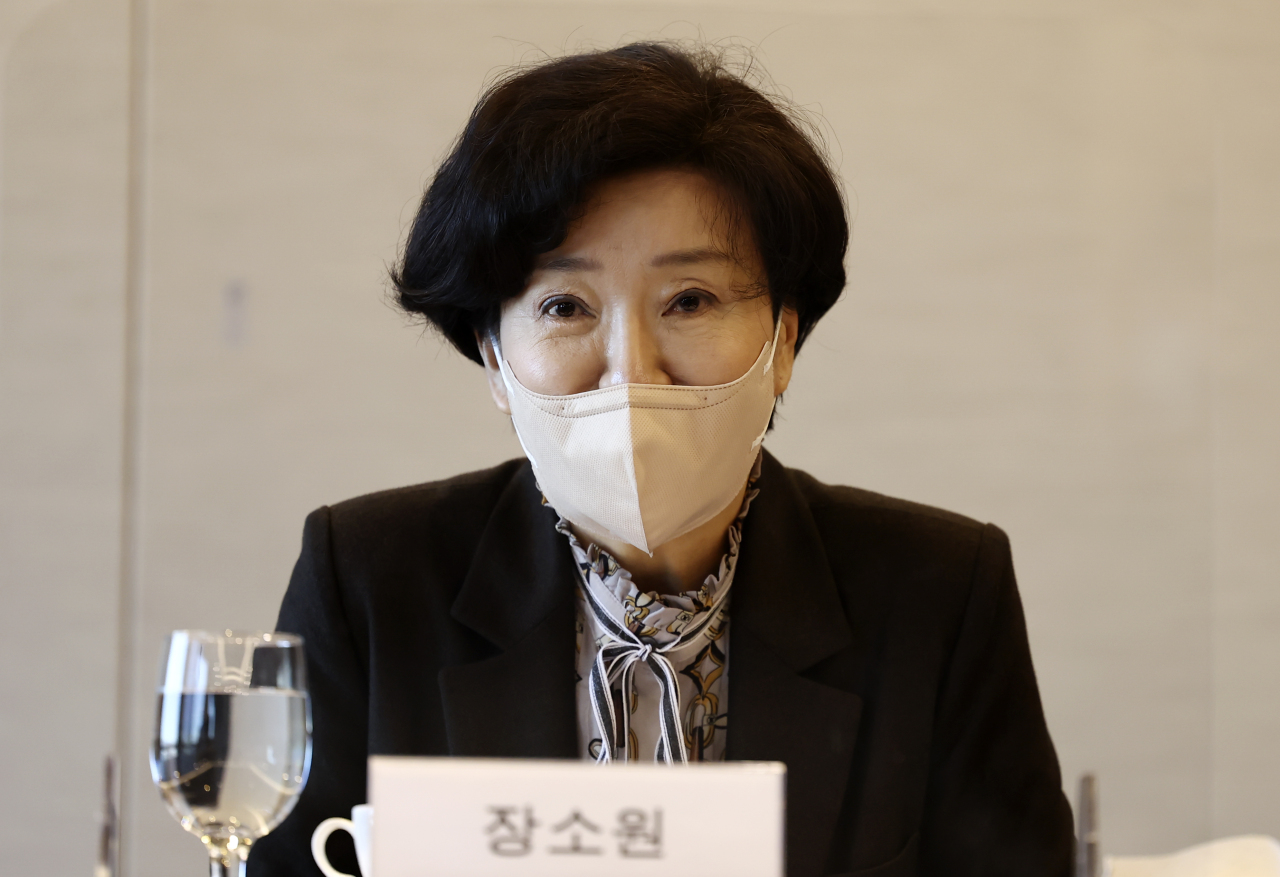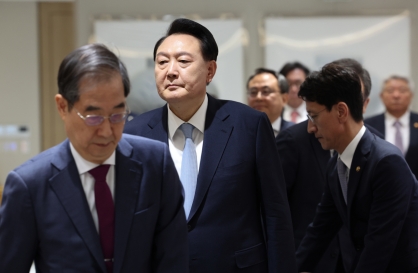National language institute to use AI to improve writing assessment
NIKL plans to carry out major revamp of dictionary
By Kim Hae-yeonPublished : Jan. 19, 2022 - 15:18

The National Institute of Korean Language unveiled an ambitious plan to create a Korean language proficiency diagnosis system that utilzes artificial intelligence, the organization’s director Chang So-won said on Tuesday.
The AI-based language proficiency test, to be developed over a five-year period from 2023 to 2027 with a budget of 10 billion won ($8.39-million), is meant to help improve the nation’s overall writing skills, which stood at 48 out of 100 in a research study conducted by NLKL in 2018. The test provides a more objective assessment of overall language skills including texts that have been ignored in private Korean language tests available now.
“While the importance of essay writing is emphasized around the world, there are no indicators to evaluate writing in Korea, so less and less colleges are having essay tests,”said Chang, a former professor in Seoul National University’s Department of Korean Language and Literature. “If we create an evaluation system at the national level, it will be useful for various entrance exams.”
“When I evaluated university entrance essays as a professor, I found the need for objective evaluation indicators,” Chang said at the conference, which was held to commemorate her 100th day in the position.
“When I looked into the SATs in the US or the Baccalaureat in France, I discovered that the evaluation criteria were very detailed.”
Regarding issues of AI-based diagnoses becoming a “Procrustean bed,” or arbitrary standard, when measuring one’s writing ability, Chang mentioned that securing objectivity is also difficult when an evaluation is conducted by a person, since each evaluator has different standards. “If we can implement an evaluation system worked on by 80 percent humans, and 20 percent with the help of AI, it can further increase efficiency. This makes it possible to conduct writing tests on a larger scale,” Chang said.
Chang also said the institute’s plans for the upcoming years include a reorganization of the Korean language dictionary and the certification program for overseas Korean instructors.
The institute’s plans to reorganize and diversify the dictionary came after its findings that the NIKL’s 1999 publication of the Standard Korean Language Dictionary has failed to reflect major changes as a result of the digital era. Dakgangjeong (sweet crispy Korean fried chicken), goshiwon (small furnished living quarters that do not require deposits) and samgak-gimbap (triangular shaped gimbap) were a few of the terms that Chang pointed out needed to be added. The dictionary also has some errors on the current usage of words, which need correction, according to the institute.
The institute estimated 7 billion won will be invested in the first phase of the project alone, between 2022 and 2026. The previous annual budget spent on the Korean dictionary operation was 200 million won.
Following the Hallyu boom in recent years, a Korean language teacher certification program will be developed to cope with growing demand for Korean language teachers abroad. To solve issues of unqualified Korean language teachers who are working in overseas private academies, the institute announced plans for issuing certificates for qualified overseas teachers upon completion of the NIKL’s special language course.
Since 1984, the NIKL has conducted research for language policy, managed linguistic rules and published the Korean dictionary, with the aim of improving the use of Korean language for communication use and increase the quality of Korean language education in general.
By Kim Hae-yeon (hykim@heraldcorp.com)
The AI-based language proficiency test, to be developed over a five-year period from 2023 to 2027 with a budget of 10 billion won ($8.39-million), is meant to help improve the nation’s overall writing skills, which stood at 48 out of 100 in a research study conducted by NLKL in 2018. The test provides a more objective assessment of overall language skills including texts that have been ignored in private Korean language tests available now.
“While the importance of essay writing is emphasized around the world, there are no indicators to evaluate writing in Korea, so less and less colleges are having essay tests,”said Chang, a former professor in Seoul National University’s Department of Korean Language and Literature. “If we create an evaluation system at the national level, it will be useful for various entrance exams.”
“When I evaluated university entrance essays as a professor, I found the need for objective evaluation indicators,” Chang said at the conference, which was held to commemorate her 100th day in the position.
“When I looked into the SATs in the US or the Baccalaureat in France, I discovered that the evaluation criteria were very detailed.”
Regarding issues of AI-based diagnoses becoming a “Procrustean bed,” or arbitrary standard, when measuring one’s writing ability, Chang mentioned that securing objectivity is also difficult when an evaluation is conducted by a person, since each evaluator has different standards. “If we can implement an evaluation system worked on by 80 percent humans, and 20 percent with the help of AI, it can further increase efficiency. This makes it possible to conduct writing tests on a larger scale,” Chang said.
Chang also said the institute’s plans for the upcoming years include a reorganization of the Korean language dictionary and the certification program for overseas Korean instructors.
The institute’s plans to reorganize and diversify the dictionary came after its findings that the NIKL’s 1999 publication of the Standard Korean Language Dictionary has failed to reflect major changes as a result of the digital era. Dakgangjeong (sweet crispy Korean fried chicken), goshiwon (small furnished living quarters that do not require deposits) and samgak-gimbap (triangular shaped gimbap) were a few of the terms that Chang pointed out needed to be added. The dictionary also has some errors on the current usage of words, which need correction, according to the institute.
The institute estimated 7 billion won will be invested in the first phase of the project alone, between 2022 and 2026. The previous annual budget spent on the Korean dictionary operation was 200 million won.
Following the Hallyu boom in recent years, a Korean language teacher certification program will be developed to cope with growing demand for Korean language teachers abroad. To solve issues of unqualified Korean language teachers who are working in overseas private academies, the institute announced plans for issuing certificates for qualified overseas teachers upon completion of the NIKL’s special language course.
Since 1984, the NIKL has conducted research for language policy, managed linguistic rules and published the Korean dictionary, with the aim of improving the use of Korean language for communication use and increase the quality of Korean language education in general.
By Kim Hae-yeon (hykim@heraldcorp.com)








![[KH Explains] How should Korea adjust its trade defenses against Chinese EVs?](http://res.heraldm.com/phpwas/restmb_idxmake.php?idx=644&simg=/content/image/2024/04/15/20240415050562_0.jpg&u=20240415144419)











![[Today’s K-pop] Stray Kids to return soon: report](http://res.heraldm.com/phpwas/restmb_idxmake.php?idx=642&simg=/content/image/2024/04/16/20240416050713_0.jpg&u=)